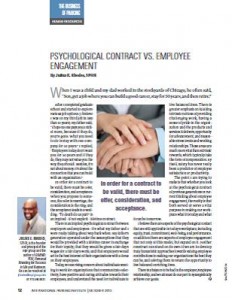When I was a child and my dad worked in the stockyards of Chicago, he often said, “Son, get a job where you can build a good career, stay for 50 years, and then retire.”
After I completed graduate school and started to explore various job options (I believe I was on my third job in less than 10 years) my father said, “I hope no one pays you a nickel more, because if they do, you’re gone. What you need to do is stay with one company for 50 years.” I replied, “Employers today don’t want you for 50 years and if they do, they may not value you the way they should. Besides, it’s not about money. It’s about the connection that you can build with an organization.”
In order for a contract to be valid, there must be offer, consideration, and acceptance. When you propose to someone, the offer is marriage; the consideration is the ring; and the acceptance leads to a wedding. “To death do us part” is an implied—if not explicit—lifetime contract.
There is an implied psychological contract between employers and employees—it’s what my father and I were really talking about way back when. My father’s generation operated under the assumptions that they would be provided with a lifetime career in exchange for their loyalty; that they would be given a fair day’s wages for a fair day’s work; and that employers would act in the best interest of their organizations with a focus on their employees.
Today, we see rising concern about individuals wanting to work for organizations that communicate effectively, have positive and caring attitudes towards their employees, and understand the need for individuals to live balanced lives. There is greater emphasis on fulfilling intrinsic notions of providing challenging work, having a sense of pride in the organization and the products and services it delivers, opportunity for advancement, and reasonable stress levels and working relationships. These areas are much more vital than extrinsic rewards, which typically take the form of compensation. By itself, salary has never really been a predictor of employee satisfaction or productivity.
The point I am trying to make is that whether you look at the psychological contract of previous generations or current thinking about employee engagement, the reality is that both served or serve a vital purpose in making our workplace what it is today and what it can be tomorrow.
I believe there are aspects of the psychological contact that are still applicable in today’s workplace, including equity, trust, commitment, well-being, and performance. In addition there are aspects of employee engagement that not only fit this model, but expand on it. Neither construct can stand on its own if we are to develop truly humanistic approaches towards valuing employee contributions in making our organizations the best they can be, and offering them in return the opportunity to live balanced enriching lives.
There is a balance to be had in the employer/employee relationship, and we all must do our part to synergistically achieve our goals.
Julius E. Rhodes, SPHR, is the founder and principal of the mpr group and the author of BRAND: YOU, Personal Branding for Success in Life and Business. He can be reached at jrhodes@mprgroup.info or 773.548.8037.
TPP-2013-10-Psychological Contract vs. Employee Engagement

